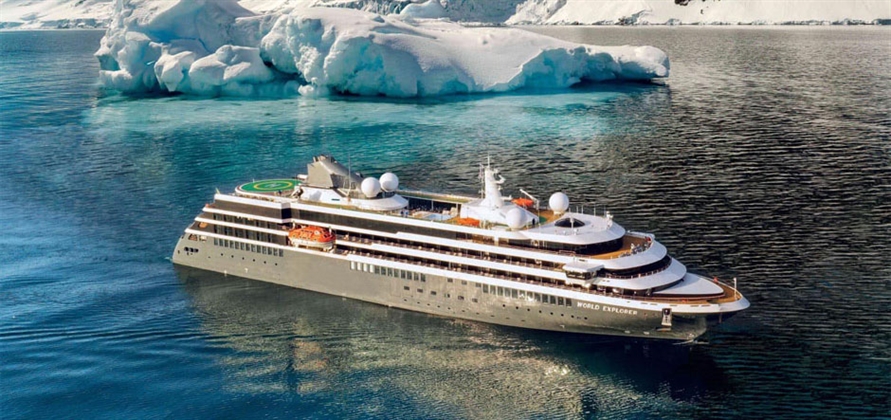Princess Cruises depends on the oceans. We are committed to environmental practices that set a high standard for excellence and responsibility and help preserve the marine environment. The ocean provides our livelihood and serves as the home for more than 25,000 of our employees.
Expedition cruises provide a unique opportunity to explore some of the world’s most remote and pristine locations. However, as the popularity of these cruises increases, it is essential that we prioritize environmental responsibility to protect and preserve these delicate ecosystems.
In this article, we will discuss the steps being taken by the cruise industry to ensure sustainable practices and reduce their impact on the environment.
Quick Navigation
Sustainable Ship Design
The first step towards environmental responsibility in expedition cruises lies in the design and construction of ships. Cruise lines are investing in innovative technologies that minimize fuel consumption and emissions.
From optimized hull designs to the use of cleaner energy sources, such as LNG or battery power, these measures help reduce the ecological footprint of cruise ships.
Waste Management
Proper waste management is crucial on expedition cruises to prevent pollution of marine ecosystems. Cruise lines have implemented comprehensive recycling programs, where waste is segregated and recycled whenever possible.
Additionally, ships are equipped with advanced wastewater treatment systems to ensure that only clean water is discharged back into the ocean.
| Recycling Types | Materials |
|---|---|
| Paper/Cardboard | Used brochures, newspapers, cardboard packaging |
| Glass | Bottles, jars, glass containers |
| Plastic | Water bottles, food containers, packaging |
| Metal | Cans, aluminum foil |
Fuel Efficiency
Fuel efficiency is a top priority for expedition cruise operators. By utilizing advanced propulsion systems and efficient routing, these ships can minimize fuel consumption, thereby reducing greenhouse gas emissions. Moreover, the use of cleaner fuels or alternative energy sources helps to further mitigate the impact on the environment.
Conservation and Research Initiatives
Expedition cruises are not only about sightseeing; they also contribute to conservation and research efforts. Cruise lines often collaborate with scientific organizations to conduct studies and collect data on marine life, climate change, and other environmental factors.
This valuable research helps in understanding and protecting these fragile ecosystems.
Visitor Guidelines and Education
Promoting responsible behavior among passengers is vital to preserving the natural habitats visited during an expedition cruise.
Cruise lines provide thorough guidelines to passengers stressing the importance of staying on marked trails, not disturbing wildlife, and minimizing waste generation. Educational programs and onboard naturalists further enrich the experience by providing information about the local ecosystems.
Supporting Local Communities
Expedition cruises bring economic opportunities to local communities. Cruise lines work closely with these communities to ensure that the benefits are shared sustainably. This involves sourcing local produce, supporting local artisans, and engaging in community development projects that promote environmental conservation and cultural preservation.

Credit: www.cruiseandferry.net
Continuous Improvement
The cruise industry understands that the journey towards environmental responsibility is an ongoing process. They actively monitor, assess, and update their practices to align with the latest environmental standards and technological advancements. By learning from best practices and sharing knowledge, the industry can collectively minimize its ecological impact.
By prioritizing environmental responsibility, the expedition cruise industry is making significant strides towards sustainable practices. Through innovative ship design, waste management, fuel efficiency, conservation efforts, visitor education, community support, and continuous improvement, expedition cruises can be enjoyed without compromising the delicate ecosystems they showcase.
As passengers, we also have a role to play by choosing environmentally responsible cruise operators and respecting the natural wonders we encounter during our trips. Together, we can create a brighter and greener future for expedition cruises.
FAQ:
What Is Environmental Responsibility On Expedition Cruises?
Environmental responsibility on expedition cruises refers to the commitment and actions taken by cruise operators to minimize negative impacts on the environment and promote sustainable practices throughout their operations.
How Do Cruise Operators Ensure Environmental Responsibility?
Cruise operators ensure environmental responsibility by implementing various measures such as waste management, using advanced technologies to reduce emissions, respecting wildlife and natural habitats, and supporting local communities.
Why Is Environmental Responsibility Important On Expedition Cruises?
Environmental responsibility is important on expedition cruises to preserve delicate ecosystems, protect biodiversity, minimize pollution, and maintain the pristine beauty of remote destinations.
It also ensures a positive and sustainable tourism experience for future generations.
How Do Expedition Cruises Contribute To Environmental Conservation?
Expedition cruises contribute to environmental conservation by raising awareness about the importance of protecting natural resources, supporting scientific research, funding conservation projects, and educating passengers about sustainable practices.
conclusion
In conclusion, the voyage through environmental responsibility on expedition cruises unveils a commitment echoing the deep seas. Princess Cruises, anchored in this ethos, epitomizes excellence and responsibility.
Expedition cruises, with their allure of remote beauty, demand a dedication to sustainability. From eco-conscious ship designs to waste management, fuel efficiency, and conservation efforts, the industry stitches together a fabric of responsible practices.
Beyond exploration, these voyages extend a helping hand to local communities, fostering economic opportunities with environmental sensitivity. Continuous improvement signifies an industry actively steering toward a greener future.
Passengers play a vital role, in choosing responsible operators and respecting the delicate ecosystems encountered. As we conclude, the harmony between the cruise industry and the environment is a promise a commitment to nurture the oceans and ensure every journey unfolds sustainably. It’s not just an end; it’s a pledge for a brighter, eco-conscious future for expedition cruises.
